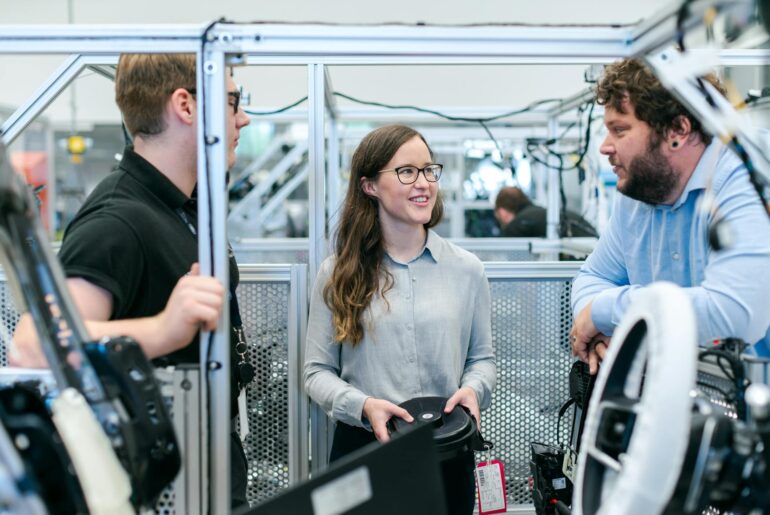This article may contain references to products or services from one or more of our advertisers or partners. We may receive compensation when you click on links to those products or services. Nonetheless, our opinions are our own.
The information presented in this article is accurate to the best of our knowledge at the time of publication. However, information is subject to change, and no guarantees are made about the continued accuracy or completeness of this content after its publication date.
- A Defining Moment for Electric Vehicles
- Ford’s Ambitious Battery Facility Plans
- Significance of EV Tax Incentives
- Strategic Drivers Behind Ford’s Decision
- Market Uncertainties
- Potential Impact on EV Buyers
- Shaping the Competitive Landscape
- Opportunities for Regional Growth
- Frequently Asked Questions
- Why has Ford decided to pursue its battery factory plans without guaranteed tax incentives?
- Could eliminating EV tax incentives affect Ford’s strategy?
- What benefits do workers gain from Ford’s battery investments?
- How does Ford’s plan affect the electric vehicle sector?
- What could this mean for electric vehicle pricing?
- Recommended Reads
A Defining Moment for Electric Vehicles
Ford Motor Company is moving decisively into the electric vehicle market by investing around $11 billion to establish extensive battery production facilities, including a state-of-the-art gigafactory in Michigan. This ambitious initiative has the potential to transform how electric vehicles are manufactured and delivered to customers, setting new benchmarks for innovation and sustainability. As conversations swirl around the potential reduction of tax incentives for electric vehicle producers, Ford’s unwavering commitment to its battery factory highlights a bold stance. This determination suggests a clear recognition of shifting consumer preferences toward greener transportation options and the long-term financial benefits of controlling the battery supply chain.
Ford’s Ambitious Battery Facility Plans
Ford’s substantial investment underscores a strategy focused on securing access to critical battery components while reducing reliance on external suppliers. By developing large-scale gigafactories, the company seeks to streamline production, improve the cost-efficiency of electric vehicles, and scale output to meet increasing demand. Gigafactories, designed for high-volume battery cell manufacturing, are needed for automakers aiming to enhance vehicle performance, extend range, and ensure competitive pricing. Ford’s planned Michigan gigafactory is expected to produce advanced battery cells for a variety of upcoming electric models, paving the way for broader EV adoption.
Significance of EV Tax Incentives
Government incentives have historically played a significant role in driving electric vehicle affordability and spurring manufacturer investment. Tax credits can encourage both automakers and consumers to embrace sustainable technologies by offsetting the high costs associated with research, development, and production. However, political discussions on potentially reducing or eliminating these incentives introduce new uncertainties into the market. Despite these challenges, Ford’s strategic decision to proceed reflects confidence in growing consumer enthusiasm for electric vehicles and a commitment to long-term competitiveness.
Strategic Drivers Behind Ford’s Decision
Several compelling factors support Ford’s strategy to continue with its battery production plans:
- Rising Consumer Demand: The appetite for electric vehicles is expanding as more individuals seek environmentally responsible transportation and as charging infrastructure improves nationwide.
- Technological Progress: Investing in in-house battery manufacturing enables Ford to integrate the latest advancements, enhancing energy density, reducing charging times, and delivering better overall performance.
- Supply Chain Control: Establishing proprietary battery production capabilities allows Ford to minimize supply disruptions and maintain cost stability even during global shortages of battery materials.
- Local Economic Boost: The construction and operation of the gigafactory are anticipated to generate substantial employment opportunities and stimulate economic activity in surrounding communities.
Voted "Best Overall Budgeting App" by Forbes and WSJ
Monarch Money helps you budget, track spending, set goals, and plan your financial future—all in one app.
Get 50% OFF your first year with code MONARCHVIP
Market Uncertainties
Market and regulatory volatility can significantly impact companies planning major capital expenditures like battery factories. Changes in tax incentives may affect short-term profitability or pricing strategies for new EVs. Nevertheless, Ford’s commitment indicates confidence in a structural trend toward electrification, independent of immediate policy shifts. Such a long-range perspective can reassure investors and partners that Ford is prepared to weather economic cycles and regulatory changes.
Potential Impact on EV Buyers
Consumers stand to benefit from Ford’s long-term battery investments in several ways:
- Increased Availability: Enhanced battery production capacity will help accelerate the rollout of new electric models across dealerships.
- Pricing Stability: Over time, larger-scale production could mitigate battery costs and support more competitive pricing for EVs, even if incentives are reduced.
- Improved Product Reliability: Direct control over battery manufacturing can enhance quality assurance and performance consistency across Ford’s electric lineup.
Shaping the Competitive Landscape
Ford’s proactive strategy could influence competitors to escalate their investments in domestic battery production. As more automakers focus on building secure, local supply chains, the electric vehicle market will likely experience intensified innovation and price competitiveness.

This momentum can drive broader adoption of clean transportation technologies, encourage investments in renewable energy solutions, and strengthen the domestic manufacturing sector.
Opportunities for Regional Growth
Beyond immediate business implications, Ford’s investment brings tangible benefits to local communities. By creating thousands of jobs and fostering workforce development, the gigafactory will support economic revitalization in the region. Local suppliers and service providers will also experience increased demand, amplifying positive effects throughout the supply chain.
Frequently Asked Questions
Why has Ford decided to pursue its battery factory plans without guaranteed tax incentives?
Ford’s commitment reflects confidence in rising demand for electric vehicles, a desire to lead on sustainable transportation, and recognition that owning battery production capacity is a strategic asset for controlling costs and technology.
Could eliminating EV tax incentives affect Ford’s strategy?
While the absence of incentives might increase near-term challenges, Ford’s focus on scale and technology leadership positions it well to compete effectively and protect margins over the long term.
What benefits do workers gain from Ford’s battery investments?
Workers can expect job creation, opportunities for skills training in advanced manufacturing, and greater long-term employment stability supported by ongoing investments in electric mobility.
How does Ford’s plan affect the electric vehicle sector?
Ford’s decisive move sends a signal to the industry about the importance of domestic battery production, potentially prompting more manufacturers to invest in U.S.-based facilities and spurring accelerated market growth.
What could this mean for electric vehicle pricing?
While short-term fluctuations are possible if tax credits change, increased battery production capacity can help moderate long-term pricing trends by lowering production costs and reducing supply constraints.

Reviewed and edited by Albert Fang.
See a typo or want to suggest an edit/revision to the content? Use the contact us form to provide feedback.
At FangWallet, we value editorial integrity and open collaboration in curating quality content for readers to enjoy. Much appreciated for the assist.
Did you like our article and find it insightful? We encourage sharing the article link with family and friends to benefit as well - better yet, sharing on social media. Thank you for the support! 🍉
Article Title: Ford’s B Battery Factory Signals a New Era of EV Manufacturing
https://fangwallet.com/2025/07/02/fords-11b-battery-factory-signals-a-new-era-of-ev-manufacturing/The FangWallet Promise
FangWallet is an editorially independent resource - founded on breaking down challenging financial concepts for anyone to understand since 2014. While we adhere to editorial integrity, note that this post may contain references to products from our partners.
The FangWallet promise is always to have your best interest in mind and be transparent and honest about the financial picture.
Become an Insider

Subscribe to get a free daily budget planner printable to help get your money on track!
Make passive money the right way. No spam.
Editorial Disclaimer: The editorial content on this page is not provided by any of the companies mentioned. The opinions expressed here are the author's alone.
The content of this website is for informational purposes only and does not represent investment advice, or an offer or solicitation to buy or sell any security, investment, or product. Investors are encouraged to do their own due diligence, and, if necessary, consult professional advising before making any investment decisions. Investing involves a high degree of risk, and financial losses may occur including the potential loss of principal.
Source Citation References:
+ Inspo
Reuters. (2025, May 29). Ford executive says loss of federal funding could ‘imperil’ battery factory. Reuters. https://www.reuters.com/business/autos-transportation/ford-executive-says-loss-federal-funding-could-imperil-battery-factory-2025-05-29/ Reuters. (2024, July 9). Michigan lowers incentives for Ford EV battery plant to match reduced output. Reuters. https://www.reuters.com/business/autos-transportation/michigan-lowers-incentives-ford-ev-battery-plant-match-reduced-output-2024-07-09/











































